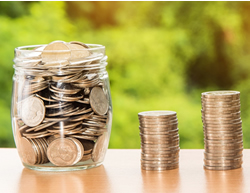Holly Johnson* says saving money is crucial, even when you think you can’t afford to do it.

Photo: Nattanan Kanchanaprat
Knowing you need to save money is one thing, but making it happen requires some extra effort.
Only you can take the required steps to set aside some of your money, which we all know can be difficult when times are tough.
But since saving money is crucial if you want to have cash for emergencies, or actually retire one day, you have to try — even when you can’t really afford to.
While saving money may not be easy (or any fun), here are some ways to get the ball rolling.
- Know where your money is going
If you’re struggling to save, the first step you should take is figuring out where your money is going.
In other words, track your spending so you know exactly what you’ve been buying and how much you’re spending on essentials.
Keeping track of your spending isn’t rocket science and, in fact, a simple notepad and pencil will do the trick.
You can also find a variety of apps and programs to choose from if you want technology to do part of the grunt work.
- Set up direct deposit into savings
The easiest way to grow your rainy-day fund involves transferring money to your savings account automatically.
From there, figure out how much you could save each month on payday and set your account up so some of your money moves to savings on its own.
When you put your deposits on autopilot, saving money becomes effortless.
And provided you can keep your hands out of the cookie jar, your money has the potential to grow much faster than you think.
- Do a no-spend challenge
Refraining from spending money for a few months might sound awful, but the end result — more cash in your wallet — may make the sacrifice worth it.
Start by stopping all non-essential spending for at least two weeks.
From there, see if you can ratchet up the timeline to four weeks, six weeks, or more.
The goal should be avoiding any spending that isn’t absolutely necessary.
This means staying away from the mall and all your favourite online stores, but it also means digging deep into your pantry and freezer to eat food you already have.
Over the weeks (and hopefully months), you should find some extra savings to stash away.
You might even wind up with some better spending habits that will leave you ahead for the long haul.
- Dump your debt
The burden of debt is significant, and it can be difficult to keep up with bills, let alone stash some money away each month.
However, getting rid of your debt can help free up cash you can save later — even if the road out of debt is an arduous one.
If your goal is getting out of debt, you’ll need to find ways to cut your spending so you can allocate more of your income toward debt repayment each month.
Another strategy is picking up a side hustle that can help you start saving, and this may be your only option if your budget is so tight there’s already nothing to cut.
Even if you tackle a small chunk of what you owe, the money you free up could be used to build up your savings account significantly.
- Save your spare change
Do you remember the old days when people would toss change into a jar?
While this savings method may not be anything revolutionary, it works.
At the end of every day, go through your pockets (or wallet) and put any coins you have into an old jar or other container.
If credit and debit cards are more your style, you still have options to save your spare change.
Like most things in life, there’s an app for that.
Over time, your spare change can take on a life of its own.
And since you’re parting with so little at a time, you probably won’t miss it.
- Get a new quote for car insurance
Shopping around for lower prices on your regular monthly expenses can help you keep more money in your pocket, and car insurance is a good place to start.
If you haven’t had a new quote for car insurance in a while, going online or making a few phone calls could save you more than you might think.
As you shop around for a new policy, ask about discounts you might qualify for that could reduce your bill even more.
- Stop shopping online
Whether you constantly find yourself tempted by Facebook ads or you like to pass the time browsing on Amazon, online shopping is a sure-fire way to sabotage your savings goals.
Unless you’re getting an item that you’d typically buy anyway (think: toilet paper or canned green beans), online shopping is probably costing you more than you think.
Too often, people browse Amazon out of boredom and wind up spending $50 or $100 on stuff they don’t even need.
If you think you can’t afford to start saving money, try uninstalling the shopping apps on your phone.
You may find you start saving when you make spending a lot less convenient.
* Holly Johnson is a freelance writer. She tweets at @ClubThrifty. Her website is clubthrifty.com.
This article first appeared at www.wisebread.com.











